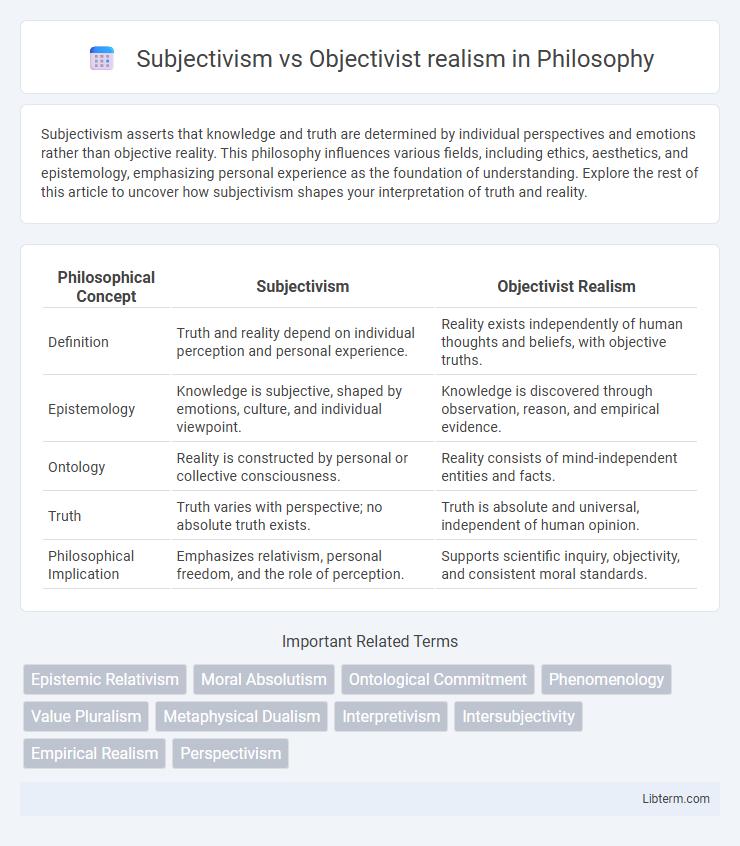Subjectivism asserts that knowledge and truth are determined by individual perspectives and emotions rather than objective reality. This philosophy influences various fields, including ethics, aesthetics, and epistemology, emphasizing personal experience as the foundation of understanding. Explore the rest of this article to uncover how subjectivism shapes your interpretation of truth and reality.
Table of Comparison
| Philosophical Concept | Subjectivism | Objectivist Realism |
|---|---|---|
| Definition | Truth and reality depend on individual perception and personal experience. | Reality exists independently of human thoughts and beliefs, with objective truths. |
| Epistemology | Knowledge is subjective, shaped by emotions, culture, and individual viewpoint. | Knowledge is discovered through observation, reason, and empirical evidence. |
| Ontology | Reality is constructed by personal or collective consciousness. | Reality consists of mind-independent entities and facts. |
| Truth | Truth varies with perspective; no absolute truth exists. | Truth is absolute and universal, independent of human opinion. |
| Philosophical Implication | Emphasizes relativism, personal freedom, and the role of perception. | Supports scientific inquiry, objectivity, and consistent moral standards. |
Introduction to Subjectivism and Objectivist Realism
Subjectivism asserts that knowledge and truth are dependent on individual perceptions, emotions, and cultural contexts, emphasizing the role of the subject in shaping reality. Objectivist Realism holds that reality exists independently of human thoughts or beliefs, maintaining that objective facts and truths can be discovered through empirical observation and logical analysis. These contrasting epistemological views shape debates in philosophy regarding the nature of truth, knowledge, and reality.
Philosophical Origins and Historical Context
Subjectivism traces its philosophical origins to Rene Descartes and later George Berkeley, emphasizing knowledge as dependent on the perceiving subject. Objectivist realism finds its roots in Aristotle's metaphysics and was systematized through the Scholastic tradition, asserting that reality exists independently of perception. The historical context of subjectivism emerged during the early modern period's epistemological turn, while objectivist realism dominated classical and medieval thought, shaping debates on the nature of truth and existence.
Core Principles of Subjectivism
Subjectivism asserts that knowledge and truth are dependent on individual perceptions, emotions, or cultural contexts, emphasizing the centrality of personal experience in shaping reality. It rejects the notion of an independent, objective reality existing outside human consciousness, positing that all truths are inherently subjective and contingent. This core principle contrasts with Objectivist realism, which maintains that an external world exists independently of observation and that truth corresponds to objective facts verified through reason and empirical evidence.
Foundations of Objectivist Realism
Objectivist realism is grounded in the principle that reality exists independently of human perception, asserting that objects possess definite properties regardless of observation. It relies on the correspondence theory of truth, emphasizing that knowledge is accurate when it aligns with the objective world. Foundations of objectivist realism include metaphysical assertions of an external reality, epistemological commitments to objective knowledge, and semantic clarity in defining truth and existence.
Key Differences Between the Two Philosophies
Subjectivism asserts that knowledge and truth are dependent on individual perspectives and experiences, emphasizing personal interpretation as the basis of reality. Objectivist realism holds that reality exists independently of human perception, maintaining that facts and truths are objective and discoverable through observation and reason. The key difference lies in subjectivism's reliance on personal viewpoint versus objectivist realism's commitment to an external, observer-independent reality.
Prominent Thinkers and Influencers
Prominent thinkers in subjectivism include George Berkeley, who argued that reality is fundamentally dependent on perception, and David Hume, who emphasized the mind's role in constructing knowledge. Objectivist realism is notably championed by Ayn Rand, who advocated for an objective reality independent of consciousness, and Aristotle, whose philosophy grounded knowledge in empirical observation and logical reasoning. These influencers shaped ongoing debates by framing reality either as mind-dependent or as existing autonomously outside human perception.
Subjectivism in Ethics and Morality
Subjectivism in ethics asserts that moral judgments are based on individual feelings, preferences, or perspectives, making morality relative to each person's experience. This view contrasts with objectivist realism, which holds that moral truths exist independently of human opinion, grounded in universal principles. Subjectivism emphasizes personal autonomy and the variability of ethical standards across cultures and individuals.
Objectivist Realism in Science and Metaphysics
Objectivist realism in science and metaphysics asserts that reality exists independently of human perception, emphasizing objective truths that can be discovered through empirical investigation and logical reasoning. This philosophy underpins scientific methodologies by maintaining that natural laws and facts remain constant regardless of observer bias or subjective experience. Objectivist realism contrasts with subjectivism by prioritizing measurable phenomena and asserting that knowledge corresponds to an external, mind-independent world.
Practical Implications in Modern Society
Subjectivism emphasizes individual perception shaping reality, influencing diverse areas such as ethics, law, and art by validating personal experiences and interpretations. Objectivist realism asserts an independent reality governed by universal truths, underpinning scientific inquiry, policy-making, and legal systems that rely on objective evidence. The practical implications in modern society involve balancing subjective viewpoints with objective facts to foster inclusive dialogues and informed decision-making across cultural, political, and technological domains.
Ongoing Debates and Future Perspectives
Ongoing debates between subjectivism and objectivist realism center on the nature of truth and perception, with subjectivism emphasizing individual experiences and interpretations while objectivist realism asserts an independent, mind-external reality. Future perspectives explore integrating cognitive science and artificial intelligence to bridge subjective perceptions with objective data, aiming to refine epistemological frameworks. Emerging interdisciplinary research seeks to resolve tensions by developing hybrid models that accommodate both the fluidity of human consciousness and the stability of external facts.
Subjectivism Infographic

 libterm.com
libterm.com